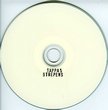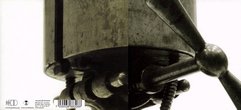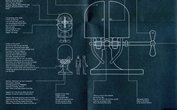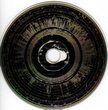|
| |||||||||||||||||||||||||||||||||||||||||||||||||||||||
|
It's a label showdown! Welcome to round 8 in the label showdown series between Metronomicon Audio and Jester Records!
Since we've more or less totally missed out on reviewing the output of these two great labels, we are going
through their entire catalogues, matching the releases from each label consecutively against each other.
Humorously counting goals Match preview The Bogus Blimp release comes in a jewel case and includes a folded insert with art, lyrics & info. The match On The Future Will be Better Tomorrow Täppas Strepens plays all kinds of instruments (except drums), and he also robs the kitchen of knives, forks, pots, pans and wine bottles. In addition he is helped out by the everpresent Sissyfus, Håkon Larsen (drums & percussion), Thomas Meidell (guitar, piano, bass, etc.) and Daniel Bakken (bass). In spite of the numerous instruments listed, the production is sparse, the tone is mellow, leaving air for the songs to breathe in, and more importantly, letting the (not printed) lyrics through. Though I really need a lyric sheet to fully focus on lyrics when listening to music, it is safe to assume that Strepens' lyrics are not afterthoughs. Some are small stories, reflections on situations and whereabouts, while others are more political in content. In some ways, many of these songs have a certain camp-fire feeling to them, but
I am not sure if the camp is located in Texas or Ireland, as some songs have an Irish feeling to them, reminding
me of The Pogues on a sober Notable is also "The Devil is at Our Tails", sort of a low-key political folk anthem, with lyric lines like
"So bring on the third world war, it's not us and them anymore, it's us versus hate slash dot com",
though the singer sounds somewhat too tired and world-weary to make it seem very activist. Still, the message gets through,
and it is followed by the anti-war message of "Dustbuster", which slabs out against US foreign policy
("if this world's an ocean then americans are sharks"). I am sure republicans would call Täppas Strepens a socialist Next, both "Worthless Gold/Goal" and "... and the Magic Spun" are fine hummable tunes, with playful arrangements, making the second part of the album seem more interesting than the first half. "We have Spaces to Fill" is just a half-minute psychedelic interlude, before "Under the Mill" closes the album, although the chorus here also go "We have spaces to fill, under the mill, we have spaces to fill, under the mill, we have hours to kill". The drunken choir singing here makes for a refreshing end to the album. To sum it up: In spite of a handful of songs that are too similar in structure
Over to the sophomore album from Bogus Blimp, cords. wires.
The short opening track "Hello World" consists mainly of radio noise, something they also used on
their fine debut Men-Mic. When this is followed by a
beeping phone on "Brothers of Space", this may feel like overdoing it a bit - like, is this Pink
Floyd for the MTV-generation After this somewhat fun opening, things quickly get bleaker with "No Cords. No Wires", where the monologue
comes from a person seemingly in a psychic void, alienated from the world by its technology.
Track 4, "Marching To Rome", clocks in at 37 seconds and I am not able to hear any words, still
lyrics for the song is printed in the booklet, so I have to assume the words are completely buried in static The man in the psychic void returns in "End Of The World", his utterings even bleaker this time: "There's a man on the sidewalk. Things calm down with "Under The Sea", the song's lyrics on becoming numb once again makes it appropriate to
mention Pink Floyd, whose "Comfortably Numb" pretty much says the same, although Bogus Blimp are more gothic
about it. "Oxygen XX" is just a short instrumental, a calmly floating interlude, where once again there are lyrics
in the booklet but none to be heard. This reflective mode continues on "Sugar & Fear":
"sugar, coffee, cigarettes and fear ... tired and sad ... yet kind of happy",
but with "Making Room For God" this introspection goes awry, describing self-mutilation in order to please or reach God.
Naturally the music also intensifies, but without reaching the aggresive peaks from the first album.
After this, "Flight To The Future" feels partly healing. The flight destination is
"the world of plastics", but the musical crescendo rather indicates that the
controls are set for the heart of the sun ... To sum it up: What starts out like a cartoonish sci-fi rant, quickly develops into a
contemplative concept album where the lyrics centre around a wretched existence, and are more important than
the mostly mood-setting music, which can be described as a spooky, dust-filled, ambient-industrial cabaret.
Does it work? Well, cords. wires' sci-fi cartoon universe is infected by depression and
not particularly inviting. Musically Bogus Blimp re-use, or to be kinder, refine the ideas from the
debut album, but lyrically this album seems bipolar and incoherent in parts Match result: Metronomicon Audio 3 (
Next match Copyright © 2010 Knut Tore Breivik
| |||||||||||||||||||||||||||||||||||||||||||||||||||||||
| You may also want to check out our Täppas Strepens articles/reviews: Beans, Bacon & Gravity, The Great American Brainkiller vs. Upland: Upland". | |||||||||||||||||||||||||||||||||||||||||||||||||||||||
| © 2011 Luna Kafé | |||||||||||||||||||||||||||||||||||||||||||||||||||||||
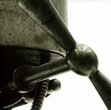
 Täppas Strepens: The Future Will Be Better Tomorrow
Täppas Strepens: The Future Will Be Better Tomorrow

